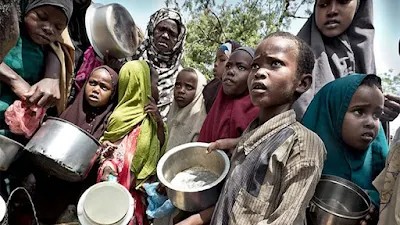Nigeria is heading toward a major hunger crisis, as a new Cadre Harmonisé food security assessment has projected that at least 34.7 million people across 27 states and the Federal Capital Territory will face acute food insecurity between June and August 2026.
The assessment, released in Abuja on Friday by the Nigeria Food Security Sector under the Federal Ministry of Agriculture and Food Security, warns that worsening insecurity, soaring food production costs and climate shocks could push millions into deeper hunger if urgent interventions are not deployed.
According to the analysis, 27.2 million Nigerians are already food insecure, including 485,109 internally displaced persons (IDPs) in Borno, Sokoto, and Zamfara. The number is expected to surge to 650,730 IDPs by mid-2026.
The projection shows the Northeast will remain the worst-hit, with Borno (2.9 million), Yobe (1.6 million) and Adamawa (1.4 million) residents expected to struggle for food during next year’s lean season.
The report also highlights alarming levels of child malnutrition in parts of Borno, Yobe, and Katsina (Jibia and Mashi LGAs), while several zones across the Northeast and Northwest have already slipped into crisis-level mortality (Phase 3). Even more disturbing, emergency-level deaths (Phase 4) have been recorded in Eastern Borno and Northern Adamawa.
The assessment attributes the worsening food crisis to persistent insurgency, banditry, kidnapping, and economic pressures, including high fertiliser and seed prices.
It also cites climate disruptions and government food import programmes that have undermined local producers by pushing down farm-gate prices.
FAO Country Representative, Hussein Gadain, described the situation as “unprecedented,” warning that without government support for rural farmers, future harvests could decline even further.
The convergence of conflict, crime, economic pressures, and climate extremes is unprecedented. The current high cost of fertiliser and seeds threatens planting seasons ahead,” Gadain said.
He commended Ekiti State for joining the Cadre Harmonisé process while urging other states yet to participate to embrace it to improve planning and response.
Federal Permanent Secretary, Dr. Marcus Ogunbiyi, said the findings serve as a wake-up call, pledging that government will deploy the results to shape interventions under the National Agricultural Growth Scheme and Agro-Pocket (NAGS-AP) and the National Food Security and Nutrition Emergency Plan.
“We cannot ignore this warning. We will integrate the findings into targeted intervention programmes to protect vulnerable households,” he assured.
The assessment was conducted with support from FAO, WFP, National Bureau of Statistics, Save the Children, Catholic Relief Services, Action Against Hunger and other humanitarian partners..
Do you want to share a story with us? Do you want to advertise with us? Do you need publicity for a product, service, or event? Contact us on WhatsApp +2348183319097 Email: platformtimes@gmail.com
We are committed to impactful investigative journalism for human interest and social justice. Your donation will help us tell more stories. Kindly donate any amount HERE




